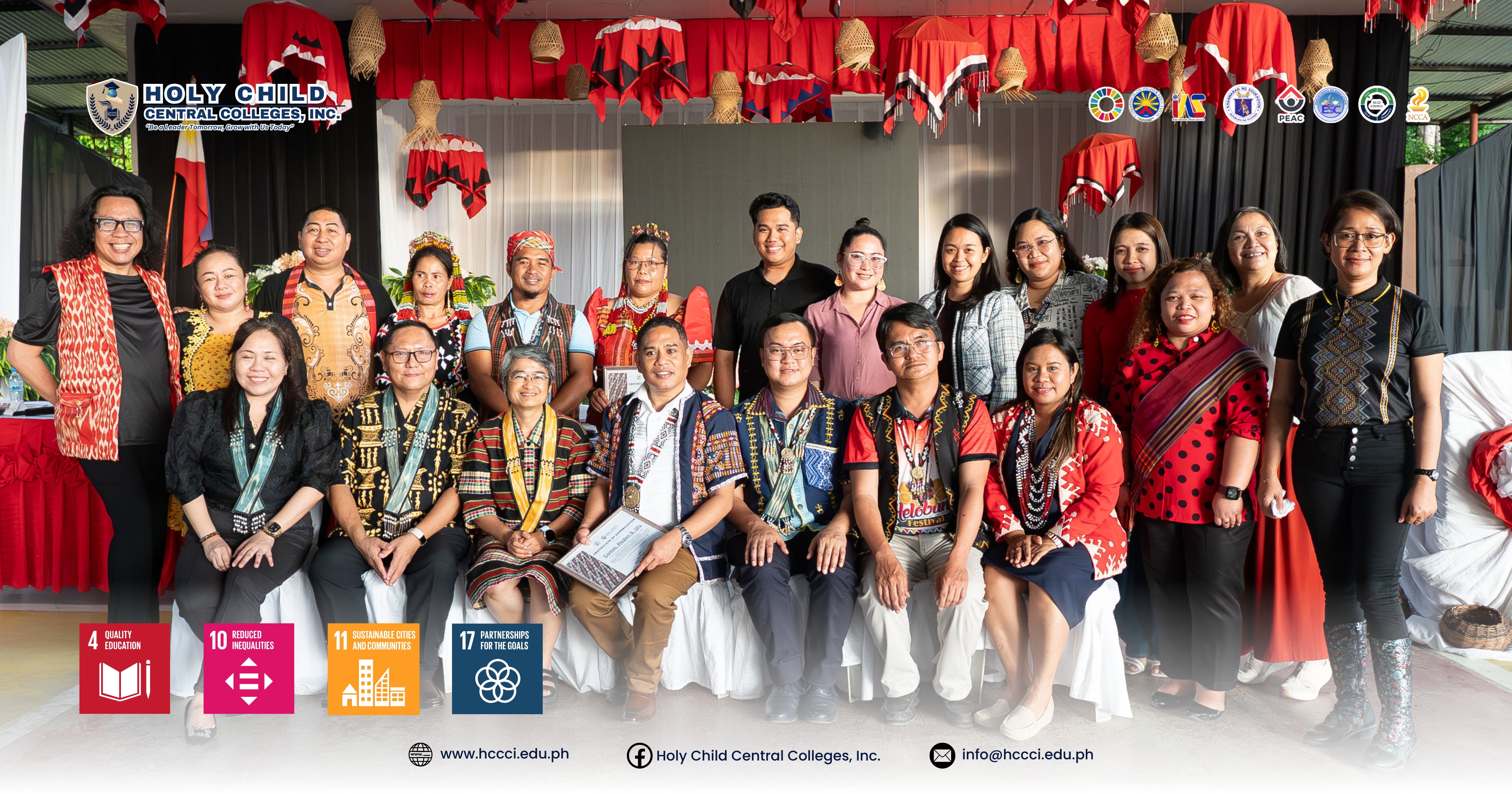Carrying Culture Forward: HCCCI and Lake Sebu Join Forces for Indigenous Education
On May 30, 2025, the Barangay Gymnasium in Poblacion transformed into more than just a forum venue—it became a vibrant stage for storytelling, healing, and community empowerment during the Indigenous People’s Education (IP Ed) Forum, the flagship event of this year’s Helubong Festival. Organized through a strong partnership between Holy Child Central Colleges, Inc. (HCCCI) and the Lake Sebu Tourism Office, the forum sent a resounding call for deeper cultural integration in education.
Far from a mere academic gathering, the forum brought together educators, indigenous leaders, students, and cultural champions to engage in heartfelt conversations about what often goes missing in formal classrooms—the lifeblood of heritage, tradition, and identity. The event was unscripted, sincere, and deeply rooted in lived experience.
For HCCCI, whose mission goes beyond delivering quality education to becoming a sanctuary for cultural preservation, the forum was more than symbolic. It embodied the institution’s commitment to inclusive, transformative education that honors the roots of its learners, especially those from indigenous communities.
“Magbago man ang panahon, dumaloy man ang daan-daang taon, nandito pa rin at napapangalagaan pa rin po Ninyo ang adhikain ng ating mga ninuno... para sa susunod po na mga henerasyon ng mga guro... naiintindihan nila, ganito dumaloy ang kasaysayan,” said Ma. Lourie Victor, Head of the Indigenous Peoples Education Office of the Department of Education, reminding attendees that IP education is not a trend but a living continuum of history and responsibility.
Voices often unheard found space at the forum. Commissioner Reden Ulo of the National Commission for Culture and the Arts (NCCA) stressed the urgent need for Indigenous youth to reconnect with their heritage:
“Minsan ang nasa marginalized, nakalimutan nila ang kanilang kultura… We need to strengthen this curriculum so that every learner doesn’t lose their path—na ito pala ang pinanggalingan namin... Culture is life for us.”
These raw, heartfelt truths gave the event its profound power. For HCCCI, deeply rooted in a tri-people community of South Cotabato, initiatives like this are not mere extracurricular activities—they are essential lifelines. The institution recognizes that for education to be truly relevant, it must first reflect the realities of its students.
Fr. Lawrence Llona of the Arnold Janssen Catholic Mission Foundation underscored the forum’s broader national significance:
“This is the beginning... This forum provides a platform to promote indigenous knowledge systems... It encourages dialogue between educators, policymakers, and indigenous leaders... fostering a culturally responsive education system.”
The forum stood as a testament to multi-sector collaboration—education, governance, and culture aligned in a unified effort. The active involvement of the LGU Lake Sebu Tourism Office was crucial, turning the Helubong Festival into more than a cultural celebration—it became a vehicle for advocacy and inclusive community development.
At the heart of the forum was the inspiring testimony of Mizpah Sunshine P. Ming, Community Flexible Learning Coordinator for HCCCI, who shared the transformative impact of the partnership between Holy Child and the Local Government Unit of T’boli.
“Unang-una sa lahat, nais kong magpasalamat sa opportunity na ito—na maishare ang aming karanasan bilang in-charge sa Flexible Learning Delivery ng Holy Child sa amin,” Mizpah said, highlighting the value of sharing learning experiences across institutions.
She explained how their collaboration was born from LGU T’boli’s vision to uplift every family through education: “Maraming vision ang nais abutin ng aming Munisipyo, isa na dito ang magkaroon ng isang professional ang bawat T’boli Family... Isa sa naging challenge namin ay paano ba magkaroon ng access doon sa Higher Education?”
The partnership’s urgency deepened during the pandemic, when many indigenous youth faced barriers to continuing their education: “Nagka-Pandemic, isang challenges... maraming kabataan, hindi po nag-aral, kaya nagkaroon ng partnership ang LGU T’boli at Holy Child doon. Naging community facilitator ako. Through that partnership, nasustain ang pag-aaral ng mga bata.”
She lauded HCCCI’s Presidential Scholarship Program, which alongside government support such as UniFAST, has been pivotal in opening doors for Indigenous learners.
Looking ahead, Mizpah expressed hope that forums like this would inspire more programs designed not only to preserve indigenous cultures but also to empower communities and improve access to government services.
Building on this momentum, HCCCI unveiled a new digital storytelling platform co-created with Lake Sebu elders and youth—an initiative designed to preserve and share oral histories, songs, and rituals in T’boli and other Indigenous languages.
This project forms part of HCCCI’s broader community extension efforts, where education extends beyond the campus and into the heart of Indigenous communities. By partnering directly with cultural bearers, the initiative ensures that traditional knowledge systems are documented, valued, and made accessible to future generations.
For both students and elders, the forum served as a powerful reminder that education is a bridge—not only between generations but between past and future. It is a path to empowerment that honors ancestral wisdom while embracing innovation.
For HCCCI, this event was not an endpoint—it was a call to listen more deeply, teach more meaningfully, and continue walking alongside communities often left at the margins. Through sustained community extension initiatives, the institution reaffirms that those at the fringes must be placed at the very center of education’s evolving narrative.
Because when education remembers where it came from, it knows exactly where it’s going.
